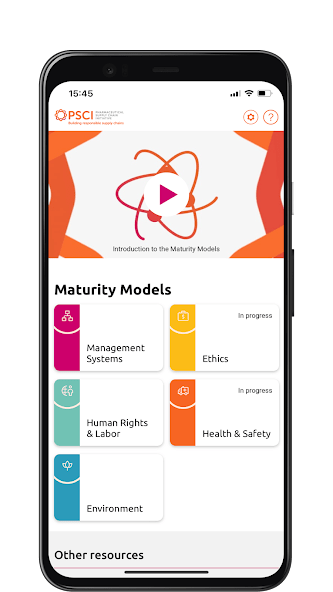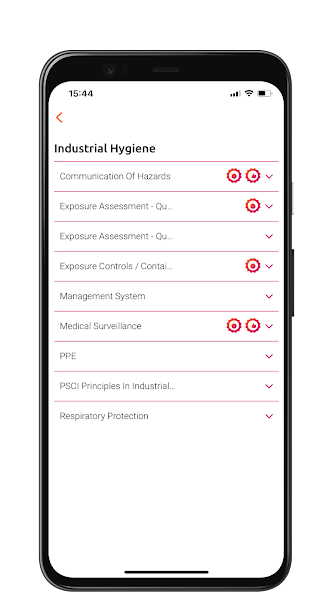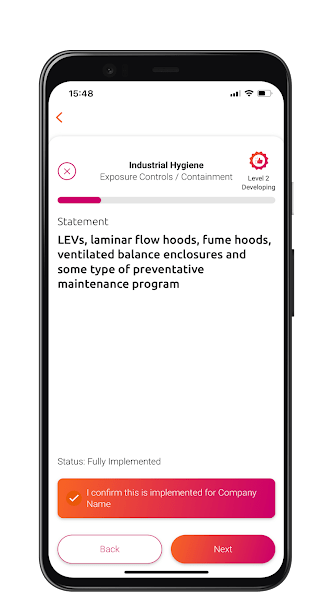PSCI Supplier Newsletter January 2026
Get a quick update on the latest PSCI news. From the newly announced 2026 Board to the launch of the integrated online audit process, new learning courses, upcoming webinars, and more.
Access our full library of resources, register for events and webinars and share audits and other assessments
Our resource library is made available freely to all in order to advance responsible supply chain practices. Here you will find information and guidance on responsible supply chain issues and the way that the PSCI works. If you have any suggestions for improvements or additions to our resources please contact us.
Get a quick update on the latest PSCI news. From the newly announced 2026 Board to the launch of the integrated online audit process, new learning courses, upcoming webinars, and more.
About: This webinar is presented in Japanese.
Antimicrobial Resistance (AMR) is a critical global challenge that poses serious threats to healthcare systems worldwide. This webinar provides a clear overview of the fundamentals of AMR and outline how the pharmaceutical industry should respond to this pressing issue.
It introduces the Antibiotic Manufacturing Standard developed by the AMR Industry Alliance and highlight emerging certification schemes designed to ensure responsible practices across the industry. In addition, key initiatives led by the SHIONOGI Group will be presented, illustrating the path toward sustainable healthcare.
This session offers a valuable opportunity to deepen your understanding of AMR and explore practical approaches to addressing this global concern.
Speakers
The slides used in the webinar can be accessed here.
About : This webinar is presented in Mandarin. It decodes the “Three-Step Framework” of the decarbonisation handbook, using seven key impact areas in the pharmaceutical industry—R&D/Clinical, Laboratories, Production & Energy, Supply Chain & Logistics, Packaging, and Green IT—as a guide.
It breaks down the potential, cost, implementation timeline, and regulatory complexity of 24 actionable carbon reduction measures one by one, helping EHS, Procurement, and Operations teams collaboratively develop a localized priority action list. Additionally, it provides an overview of six key organizational capabilities to support implementation from pilot to scale.
Speakers
PSCI China Website link: Toward Net-Zero - Interpreting the PSCI Decarbonization Playbook
About: This webinar is presented in Mandarin and the presentation slides are bilingual in Mandarin/English.
This webinar outlines the market for renewable energy procurement in China and opportunities to progress renewable energy sourcing.
Speakers
PSCI China Website link: Renewable Energy Sourcing: Market and Practice
2025 was another year of impact for the PSCI, full of highlights that were made possible by the dedication and expertise of our Members and delivered benefits for Members, suppliers, and ultimately patients across the world.
From projects to partnerships and beyond, the PSCI is the place to be for collaboration across the sector, creating change, impact, and value.
Through the contributions of the Board, Committees, Topic Teams, and Regional Teams, we are shaping the supplier market and delivering our mission of building responsible supply chains.
Watch this video to hear more.
The third session of the 2025 PSCI China Supplier Conference took place on November 19, covering Environment, Decarbonisation, Audit.
2025年中国供应商大会第三天于上海线下举行,覆盖安全总览、过程安全、工业卫生议题。
Speaker:
Liang Hong | Engineering Manager | WSP
演讲嘉宾:
洪亮 | 工程经理 | 科进柏诚工程技术(北京)有限公司上海分公司
Topic: The design, operation and maintenance of isolator
议题:隔离器的设计、使用和维护
To access the slides, please click "DOWNLOAD". 下载会议PPT,请点击下方DOWNLOAD按钮
The third session of the 2025 PSCI China Supplier Conference took place on November 19, covering Environment, Decarbonisation, Audit.
2025年中国供应商大会第三天于上海线下举行,覆盖安全总览、过程安全、工业卫生议题。
Speaker:
David Lv | Technical Director | BEEREE Safety Technologies (Hangzhou) Co., Ltd.
演讲嘉宾:
吕华军 | 技术总监 | 碧瑞安全技术(杭州)有限公司
Topic: Discussions on Differences Between Exposure Assessment and Airtightness Testing
议题:暴露评估与密闭性测试的差异分享
To access the slides, please click "DOWNLOAD". 下载会议PPT,请点击下方DOWNLOAD按钮
The third session of the 2025 PSCI China Supplier Conference took place on November 19, covering Environment, Decarbonisation, Audit.
2025年中国供应商大会第三天于上海线下举行,覆盖安全总览、过程安全、工业卫生议题。
Speaker:
Jiawei Zhang | IH Service Leader | Zhanghan Consulting (Shanghai) Co., Ltd.
演讲嘉宾:
张佳维 | 工业卫生服务经理 | 章含管理咨询(上海)有限公司
Topic: Comprehensive Lifecycle Management of Chemicals and Hazards
议题:化学品及其危害因素的全流程管理
To access the slides, please click "DOWNLOAD". 下载会议PPT,请点击下方DOWNLOAD按钮
The third session of the 2025 PSCI China Supplier Conference took place on November 19, covering Environment, Decarbonisation, Audit.
2025年中国供应商大会第三天于上海线下举行,覆盖安全总览、过程安全、工业卫生议题。
Speaker:
Lemon Wu | IDP Section Manager | TUV SUD
演讲嘉宾:
吴宙遨 | 防爆部门经理 | 南德意志大中华集团上海分公司
Topic: Overview of Dust Explosion Parameter Measurement and Dust Removal System Design
议题:制药行业粉尘爆炸参数的测定与除尘系统设计概论
To access the slides, please click "DOWNLOAD". 下载会议PPT,请点击下方DOWNLOAD按钮
The third session of the 2025 PSCI China Supplier Conference took place on November 19, covering Environment, Decarbonisation, Audit.
2025年中国供应商大会第三天于上海线下举行,覆盖安全总览、过程安全、工业卫生议题。
Speaker:
Roderick Yuan | Technical Director | Shanghai STRM Technology Co., Ltd.
演讲嘉宾:
员文权 | 技术总监 | 上海翊员科技有限公司
Topic: Application of LOPA in SIL Determination
议题:LOPA在SIL定级中的应用
To access the slides, please click "DOWNLOAD". 下载会议PPT,请点击下方DOWNLOAD按钮
The third session of the 2025 PSCI China Supplier Conference took place on November 19, covering Environment, Decarbonisation, Audit.
2025年中国供应商大会第三天于上海线下举行,覆盖安全总览、过程安全、工业卫生议题。
Speaker:
Ken Sun | AP EHS&S Lead | GSK
演讲嘉宾:
孙大勇 | 亚太区EHS与可持续发展经理 | 葛兰素史克
Topic: PSCI Audit Findings on Process Safety and Incident Sharing
议题:安全事故案例分享及PSCI过程安全相关审计发现
To access the slides, please click "DOWNLOAD". 下载会议PPT,请点击下方DOWNLOAD按钮
The second session of the 2025 PSCI China Supplier Conference took place on November 18, covering Environment, Decarbonisation, Audit.
2025年中国供应商大会第二天于上海线下举行,覆盖环境、节能减排、审计议题。
Speaker:
Lei Jiang | EHS Executive Director | Pharmaron Shaoxing Co., Ltd.
演讲嘉宾:
蒋磊 | EHS执行总监 | 康龙化成(绍兴)药业有限公司
Topic: Environmental practice based on the PSCI Management Maturity Model
议题:基于PSCI成熟度模型的环境管理实践
To access the slides, please click "DOWNLOAD". 下载会议PPT,请点击下方DOWNLOAD按钮
The second session of the 2025 PSCI China Supplier Conference took place on November 18, covering Environment, Decarbonisation, Audit.
2025年中国供应商大会第二天于上海线下举行,覆盖环境、节能减排、审计议题。
Speaker:
Jinyun Tang | EHS Lead | Chongqing Carelife Pharmaceutical Co., Ltd.
Wenjun Wang | Senior EHS Manager | Pfizer
Victor Ren | Supplier HSE Assurance Manager | Sandoz
演讲嘉宾:
唐金云 | EHS主管 | 重庆凯林制药有限公司
王文君 | 高级EHS经理 | 辉瑞
任维农 | 供应商HSE保障主管 | 山德士
Topic: Round Table Session: Practice Sharing for AMR Certification
议题:圆桌讨论:AMR认证实践经验分享
To access the slides, please click "DOWNLOAD". 下载会议PPT,请点击下方DOWNLOAD按钮
The second session of the 2025 PSCI China Supplier Conference took place on November 18, covering Environment, Decarbonisation, Audit.
2025年中国供应商大会第二天于上海线下举行,覆盖环境、节能减排、审计议题。
Speaker:
Thea Zhang, EHS Supervisor, Boehringer-Ingelheim
演讲嘉宾:
张前雯,EHS主管,勃林格殷格翰
Topic: PSCI Supplier Decarbonisation Playbook
议题:PSCI供应商减碳手册解读
To access the slides, please click "DOWNLOAD". 下载会议PPT,请点击下方DOWNLOAD按钮
The second session of the 2025 PSCI China Supplier Conference took place on November 18, covering Environment, Decarbonisation, Audit.
2025年中国供应商大会第二天于上海线下举行,覆盖环境、节能减排、审计议题。
Speaker:
David Wei | Associate Director of Utility Management | AstraZeneca
Shuji Chen | Associate Director | EECO2 China (affiliated with Energy Efficiency Consultancy Group Limited)
演讲嘉宾:
韦雁翔 | 介质管理副总监 | 阿斯利康
陈蜀冀 | 副总监 | 易客图(苏州)信息有限公司
Topic: Improving Energy Efficiency
议题:能源效率提升的实施路径
To access the slides, please click "DOWNLOAD". 下载会议PPT,请点击下方DOWNLOAD按钮
The first session of the 2025 PSCI China Supplier Conference took place on November 17, covering Introduction, Management System, Human Rights & Ethics.
2025年中国供应商大会第一天于上海线下举行,覆盖PSCI 最新发展、管理体系、劳工与商业道德议题。
Speaker:
Minnie Mai | Senior Technical Manager | TUV Rheinland
演讲嘉宾:
麦璐 | 高级技术经理 | TUV莱茵
Topic: Information Security & Personal Data Protection in PSCI Audits/AI Application
议题:PSCI审计/AI应用中的信息安全与隐私数据保护
To access the slides, please click "DOWNLOAD". 下载会议PPT,请点击下方DOWNLOAD按钮
The first session of the 2025 PSCI China Supplier Conference took place on November 17, covering Introduction, Management System, Human Rights & Ethics.
2025年中国供应商大会第一天于上海线下举行,覆盖PSCI 最新发展、管理体系、劳工与商业道德议题。
Speaker:
Xiaoming Wang | Principal Consultant | QD Wagner Biotechnology Consulting Co., Ltd.
演讲嘉宾:
王晓明 | 首席顾问 | QD瓦格纳生物科技咨询有限公司
Topic: Bacteria Endotoxin Testing Theory & Practice
议题:细菌内毒素检测的理论与实践
To access the slides, please click "DOWNLOAD". 下载会议PPT,请点击下方DOWNLOAD按钮
The first session of the 2025 PSCI China Supplier Conference took place on November 17, covering Introduction, Management System, Human Rights & Ethics.
2025年中国供应商大会第一天于上海线下举行,覆盖PSCI 最新发展、管理体系、劳工与商业道德议题。
Speaker:
Lena Pan | Team Leader | Baohua Law Firm
演讲嘉宾:
潘丽娜 | 团队负责人 | 保华律师事务所
Topic: Occupational Health & Safety Management and Social Insurance
议题:劳动用工合规——职业健康安全与社会保险制度
To access the slides, please click "DOWNLOAD". 下载会议PPT,请点击下方DOWNLOAD按钮
The first session of the 2025 PSCI China Supplier Conference took place on November 17, covering Introduction, Management System, Human Rights & Ethics.
2025年中国供应商大会第一天于上海线下举行,覆盖PSCI 最新发展、管理体系、劳工与商业道德议题。
Speaker:
Emma Lu | Technical Solution Manager | BSI
演讲嘉宾:
卢峻仪 | 技术方案经理 | 英国标准协会
Topic: How to ensure working hours and salary benefits‘ compliance
议题:如何确保员工工作时间和薪资福利符合要求
To access the slides, please click "DOWNLOAD". 下载会议PPT,请点击下方DOWNLOAD按钮
The first session of the 2025 PSCI China Supplier Conference took place on November 17, covering Introduction, Management System, Human Rights & Ethics.
2025年中国供应商大会第一天于上海线下举行,覆盖PSCI 最新发展、管理体系、劳工与商业道德议题。
Speaker:
Felix Ding | Region HSE Lead | Novartis
Graham Ding | HSE EPRM Business Partner | Novartis
演讲嘉宾:
丁晓阳 | 地区HSE主管 | 诺华
丁周琛 | HSE EPRM 业务伙伴 | 诺华
Topic: Building an ESG Management Structure
议题:ESG管理体系搭建
To access the slides, please click "DOWNLOAD". 下载会议PPT,请点击下方DOWNLOAD按钮
The first session of the 2025 PSCI China Supplier Conference took place on November 17, covering Introduction, Management System, Human Rights & Ethics.
2025年中国供应商大会第一天于上海线下举行,覆盖PSCI 最新发展、管理体系、劳工与商业道德议题。
Speaker:
Li Liu | EHS&S Manager| Boehringer-Ingelheim / PSCI China Regional Committee Co-Lead
演讲嘉宾:
刘立 | EHS&S 主管 | 勃林格殷格翰 / PSCI中国区负责人
Topic: Updates on PSCI
议题:PSCI最新动态
To access the slides, please click "DOWNLOAD". 下载会议PPT,请点击下方DOWNLOAD按钮
The first session of the 2025 PSCI China Supplier Conference took place on November 17, covering Introduction, Management System, Human Rights & Ethics.
2025年中国供应商大会第一天于上海线下举行,覆盖PSCI 最新发展、管理体系、劳工与商业道德议题。
Speaker:
Fei Ren | Director of DIvision III of Multilateral Cooperation, Department of Multilateral Cooperation | Deputy Secretary General of Sustainable Markets Initiative China Council
演讲嘉宾:
任飞 | 中国国际商会多边部多边合作三处处长 | ”可持续市场倡议“中国理事会副秘书长
Topic: Deepen Green Transformation and Jointly Build a Zero-Carbon Healthcare System —— Practice and Outlook of the Health Working Group under the Sustainable Markets Initiative China Council
议题:深耕绿色转型,共筑零碳医疗 ——“可持续市场倡议” 中国理事会健康系统工作组实践与展望
To access the slides, please click "DOWNLOAD". 下载会议PPT,请点击下方DOWNLOAD按钮
The pharmaceutical sector's Scope 3 emissions from purchased goods and services total over 272 million tCO2-e, representing more than 80% of the industry's carbon footprint. This webinar highlights how suppliers across the pharmaceutical value chain are driving verified, measurable climate impact and helping companies meet rising ESG expectations.
Join James Connelly, CEO of My Green Lab, to deep dive into the tools empowering pharmaceutical suppliers to deliver verified sustainability performance. He will cover the Converge Supplier Initiative, My Green Lab Certification, the ACT RFP Letter, ACT API integration into purchasing platforms, and the ACT Ecolabel for verified claims. James will also share insights from My Green Lab's 2025 Carbon Impact Report, showing how supplier engagement accelerates Scope 3 reductions. Whether you’re a supplier seeking to differentiate or a pharmaceutical company aiming to strengthen supplier collaboration, this session offers actionable pathways to achieve measurable climate results.
The associated slides for this recording can be found here
Pharmaceutical and healthcare companies run thousands of audits of their suppliers’ sites annually. Audits typically require between two to four days of focused, on-site effort from both the auditor and the supplier. PSCI members work together to share these audits, in support of greater transparency and valuable efficiencies that benefit both members and suppliers.
This report shares our analysis of findings from PSCI audits available on our platform. Each year, we review these in line with the PSCI Principles to identify trends, highlight improvements, and share recommendations. PSCI work with member companies, suppliers, and regional partners to turn analysis into practical guidance, training, and peer learning that suppliers can implement quickly. Overall, this analysis provides deep insight into supplier practices within the pharmaceutical and healthcare industry and suggests where collaborative efforts will have the greatest impact, guiding us on developing targeted resources and trainings.
This year’s report analyzes 2,046 findings from 228 supplier audits uploaded to the PSCI platform in 2024. These findings are categorised into 428 Governance & Management Systems findings, 26 Ethics findings, 273 Human Rights findings, 1,098 Health & Safety findings, and 221 Environment findings, offering a comprehensive overview of supplier practices and opportunities for improvement. The report includes a summary of findings across key topics, as well as a regional analysis looking at patterns across China, India, US, Western Europe, and other regions represented in this year’s uploads, presenting recommended actions for suppliers.
The commercial and sales teams in the pharmaceutical industry spend a significant amount of time traveling to meet healthcare providers, distributors, and customers across diverse geographies. Road safety is the number one risk in India and road incidents directly impact personal safety, business continuity, and customer engagement.
This session will cover key aspects of road safety including safe driving practices and behaviours, managing fatigue and stress on the road, and the importance of avoiding distractions while driving. Demonstrating leadership in road safety strengthens employee engagement, corporate reputation, supports ESG commitments, and contributes to India’s National Road Safety Mission. By participating, you can help your organizations drive collective action towards a safer, more responsible, and resilient pharmaceutical ecosystem.
Speakers:
Mahesh Chandak
Head of SSHE - South Asia and Global Road Safety Lead, Bayer
Rajani Chavan
SSHE Enablement Lead, South Asia and India Road Safety lead, Bayer
The associated slides can be downloaded here
The commercial and sales teams in the pharmaceutical industry spend a significant amount of time traveling to meet healthcare providers, distributors, and customers across diverse geographies. Road safety is the number one risk in India and road incidents directly impact personal safety, business continuity, and customer engagement.
This session will cover key aspects of road safety including safe driving practices and behaviours, managing fatigue and stress on the road, and the importance of avoiding distractions while driving. Demonstrating leadership in road safety strengthens employee engagement, corporate reputation, supports ESG commitments, and contributes to India’s National Road Safety Mission. By participating, you can help your organizations drive collective action towards a safer, more responsible, and resilient pharmaceutical ecosystem.
Speakers:
Mahesh Chandak
Head of SSHE - South Asia and Global Road Safety Lead, Bayer
Rajani Chavan
SSHE Enablement Lead, South Asia and India Road Safety lead, Bayer
The recording for this webinar can be accessed here
The PSCI was delighted to exhibit at CPHI Frankfurt 2025 as an Official Sustainability Partner of the conference. We engaged with Members, Supplier Partners, and other Partners all working towards building responsible supply chains.
Check out our highlights video and see you next year at CPHI Milan!



The PSCI Maturity App provides an interactive experience of the PSCI Maturity Models. Available on Android and iOS.